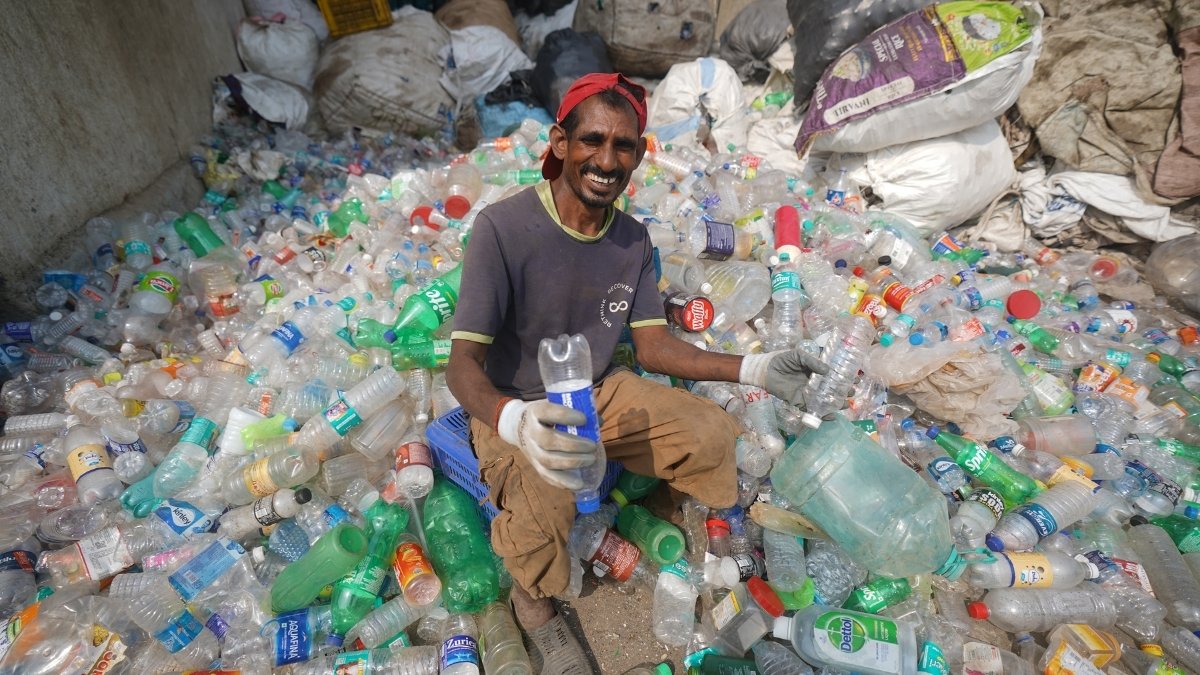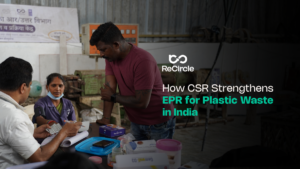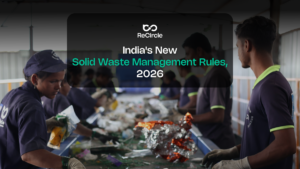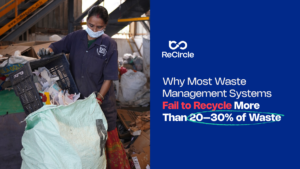India generates an estimated 7.4 million tonnes of plastic waste annually, with nearly 40% of it mismanaged or littered, choking drains, polluting rivers, and leaching toxins into soil and air. While informal waste pickers recycle a significant portion, only about 13% of plastic waste is effectively recycled, leaving the rest to clog landfills or enter waterways. With plastic use expected to rise fivefold by 2060, tackling this crisis demands smarter, tech-driven solutions and circular economy practices.
In this blog, we explore how innovative technologies, data-led traceability tools, and community-driven initiatives are reshaping India’s Plastic Waste Management landscape for a cleaner, greener future.
1. Understanding the Plastic Problem at Its Core
Before exploring solutions, it’s vital to understand the complexity of plastic waste:
- Linear Economy Trap: The traditional “take-make-dispose” model results in excessive production and short-term use of plastics.
- Durability vs. Disposal: Plastics are designed to last, but are often used for minutes (like packaging), causing long-term waste.
- Poor Collection & Sorting: Inadequate infrastructure in many regions results in mixing of recyclable and non-recyclable plastics.
Why This Matters:
Without an integrated approach, plastic waste not only clogs landfills but leaks into rivers, oceans, and even our food chains in the form of microplastics.
2. Circular Economy Models for Plastic Waste
A circular economy moves beyond recycling; it reimagines how materials are produced, used, and reintegrated.
Key Circular Strategies:
- Design for Reuse: Encourage product and packaging design that enables easy reuse or refill.
- Plastic Credits & Offsetting: Programs that allow businesses to fund waste recovery to balance their plastic footprint.
- Extended Producer Responsibility (EPR):ReCircle enables brands to fulfil their EPR obligations through transparent plastic recovery systems, driving India’s shift to a circular economy.
Global Examples:
- Loop (TerraCycle): Offers reusable packaging for consumer brands.
- Plastic Bank: Incentivizes plastic collection with blockchain-backed digital tokens.
3. Decentralized Collection & Community Engagement
Empowering local communities is a cornerstone of sustainable waste management.
Community-Centric Approaches:
- Informal Sector Inclusion: Recognizing and formalizing waste pickers improves efficiency and dignity of labor.
- Decentralized MRFs: Small-scale Material Recovery Facilities (MRFs) allow efficient segregation closer to waste sources.
- Incentivized Collection: Token-based or cashback models to encourage individuals to return plastic waste.
Tools for Empowerment:
- Mobile apps for tracking collections.
- Partnerships with schools and housing societies.
- Education drives waste segregation.
4. Smart Technology for Smarter Sorting
Modern technology is reshaping how plastic waste is managed:
Tech-Driven Innovations:
- AI-Powered Sorting Systems: Automated conveyor belts using AI and robotics to identify and separate plastics by type.
- Infrared Spectroscopy: Helps detect different polymers, increasing sorting accuracy.
- Blockchain for Traceability: Tracks the journey of plastic from collection to recycling, building trust and transparency.
Technology + Data support traceability and transparency in powerful ways:
At Recircle ClimaOne, our end‑to‑end traceability platform bridges informal waste ecosystems with formal business needs, empowering brands, processors, and collectors with real-time data, dashboards, and compliance capabilities.
- Our tools and dashboards track every kilo of plastic collected, mapping it from source through processing, creating trust with brands and communities alike.
- By digitizing collection logs, vehicle routes, inventory, and certificates, ClimaOne turns offline, manual systems into a visible, efficient, accountable circular supply chain.
5. Bioplastics and Alternatives
While reducing plastic use is critical, alternative materials also play a role in sustainable management.
Alternatives to Conventional Plastics:
- Biodegradable Plastics: Made from natural materials like corn starch, which degrade faster than petroleum-based plastics.
- Compostable Plastics: Break down in industrial composting conditions without leaving harmful residues.
- Mycelium Packaging: Mushroom-based packaging used as a sustainable alternative for foam and plastic.
Note: In India, most biodegradable and compostable plastics need controlled heat, moisture, and microbial activity found only in industrial composting facilities. Since India lacks widespread infrastructure for such facilities, these plastics often end up in landfills, where they decompose very slowly, similar to regular plastics.
6. Policy and Regulation for Systemic Change
Smart waste management is incomplete without supportive policy frameworks.
Plastic Waste Management Rules, 2016, Amended in 2022
- These are government regulations designed to reduce plastic pollution in India.
- These rules make it mandatory to phase out identified single-use plastic items, improve collection, segregation, and recycling systems, and enforce Extended Producer Responsibility (EPR), making producers, importers, and brand owners accountable for managing the plastic they introduce into the market.
- The 2022 amendment also emphasizes promoting eco-friendly alternatives and building a more circular economy, aligning with sustainability-focused businesses like ReCircle.
Effective Regulations Include
- Plastic Bans and Levies: Restrictions on single-use plastics and charges to reduce unnecessary usage.
- Mandatory EPR Implementation: Forcing manufacturers to participate in the collection and recycling of their products.
- Waste Import/Export Rules: Preventing developing countries from becoming dumping grounds for plastic waste.
The alignment of municipal, regional, and national policies with global climate goals is essential for scalable impact.
7. Data-Driven Insights and Lifecycle Thinking
Why Data Matters:
- Accurate waste mapping reveals where intervention is most needed.
- Lifecycle analysis (LCA) helps determine the true environmental cost of materials, from extraction to disposal.
Metrics for Smarter Decisions:
- Recyclability index of materials
- Carbon footprint of waste processing methods
- Material recovery efficiency
8. The Path Forward: Integration, Innovation, Inclusion
Plastic waste management is not a single-player game. It requires collaboration across:
- Industries: To reduce virgin plastic use and redesign products.
- Governments: To enforce and support sustainable systems.
- Citizens: To adopt responsible consumption and disposal behaviors.
- Innovators: To develop scalable and adaptable technologies.
Explore More:- Recycling crisis: India’s plastic waste keeps piling up to alarming levels
People, Policies, & Progress: A Unified Front Against Plastic Waste
The challenge of plastic waste is significant, but so is the potential for impactful change. By combining smart systems, inclusive communities, responsible design, and supportive policies, we can transition toward a world where plastic no longer pollutes but powers a sustainable future.
ReCircle and similar initiatives exemplify how circular thinking, community-driven action, and tech innovation can converge to create long-lasting, systemic impact.
Join the Circular Revolution with ReCircle!
Partner with us to build responsible waste management systems, close the plastic loop, and make sustainability profitable. Let’s turn plastic waste into valuable resources together.
Ready to Make an Impact?
Visit ReCircle and take the first step toward a cleaner, greener, and circular future today!




